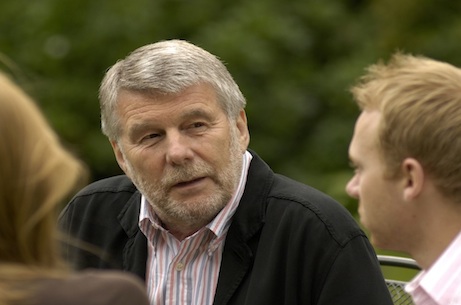
Professor Barry Everitt has been awarded the prestigious Fondation Ipsen Neuronal Plasticity Prize for 2014.
The Provost of the Gates Cambridge Trust Professor Barry Everitt has been awarded the prestigious Fondation Ipsen Neuronal Plasticity Prize for 2014 for his research on the neuropsychology of drug addiction.
The prize, created in 1990, is awarded to researchers in recognition of outstanding contributions in the field of neuronal plasticity, including development, synaptogenesis, aging, regeneration and memory. It may be shared by several researchers involved in the same research field. The recipients are chosen by an international jury of seven experts, led by Professor Nikos Logothetis of the Max Planck Institute for Biological Cybernetics, Tubingen, Germany.
The prize in 2014 is shared between Professor Everitt of the Department of Psychology and Behavioural and Clinical Neuroscience Institute, University of Cambridge, George F. Koob newly appointed Director of the National Institute of Alcohol Abusde and Alcoholism, Washington DC, USA and Michel Le Moal of the Inserm – Université Bordeaux Segalen Unité Neurogenèse et Physiopathologie, Bordeaux, France.
The prize recognises Professor Everitt’s research and that of his research group and collaborators, which is funded by the Medical Research Council. This research has several key themes: (i) the impact of learning on the development and persistence of drug addiction, in particular the mechanisms by which some, but not all individuals who initially take drugs eventually lose control over drug intake so that drug seeking becomes a compulsive habit that is extremely difficult to relinquish; (ii) the nature of vulnerability to addiction, for example the Cambridge laboratory has shown that impulsivity confers vulnerability to cocaine addiction and are defining its neural basis; (iii) the neural mechanisms by which environmental stimuli become associated through Pavlovian conditioning with the effects of addictive drugs to exert a powerful control over addictive behaviour by eliciting drug craving and relapse in otherwise abstinent individuals; (iv) the neural and cellular mechanisms by which retrieved drug memories enter a labile state from which they must be restored in the brain through a process known as reconsolidation. Disrupting this reconsolidation process can prevent subsequent drug seeking and relapse and offers the potential of novel and effective treatments for addiction.
The prize will be awarded at the Federation of European Neuroscience Societies biennial Forum in Milan in July.
Established in 1983 under the aegis of the Fondation de France, the mission of the Fondation Ipsen is to contribute to the development and dissemination of scientific knowledge and to foster interaction between researchers and clinical practitioners on the major issues of the 21st century.
It has developed an important international network of scientific experts who meet regularly and has been working in partnership with international research bodies and science journals. It has produced several hundred publications and has awarded prizes and research grants to more than 250 scientists and biomedical researchers.












